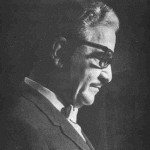JOSÉ ANGEL BUESA, “The Poet of Love”, reciter, poet. VIDEO.
José Angel Buesa (Cienfuegos, Cuba 1910-Santo Domingo, Dominican Republic, 1982) was a romantic poet with a clear tone of melancholy throughout his poetry, which is primarily elegiac. It has been called the “poet in love.” It has been considered the most popular poets in the Cuba of her time. Its popularity was due in large part to the clarity and depth of feeling in his work. Many of his poems have been translated into English, Portuguese, Russian, Polish, Japanese and Chinese. Many others have been put to music or sung in about 40 LPs.
It was also a novelist and screenwriter for Cuban radio and television, was also celebrated director of radio programs on stations RHC-Cadena Azul and CMQ, and nonexistent.
Buesa was born on September 2, 1910 in Las Cruces, near Cienfuegos, Cuba. At age 7 he began to write his first verses. In his teens he moved to Cienfuegos to continue his studies at the College of the Marist Brothers. People, reeds, and all means of Cienfuegos, has a charm in the poet’s soul, which begins to take shape in his verses the magic of the surrounding landscape. Still young, he moved to Havana, where he joined literary groups existing at the time and began to publish his poems at age 22 (1932) with a huge success.
After a very productive first step, Buesa is forced to leave Cuba to begin a painful journey through Spain, Canary Islands, El Salvador and finally Santo Domingo. The last years of his life were spent in exile, and devoted himself to teaching, serving as professor of literature at the Universidad Nacional Pedro Henríquez Ureña in the Dominican Republic, where he died on August 14, 1982. In the poem dedicated to his mother, Buesa clearly reflects the suffering caused by having to leave their homeland.
Buesa was a slim but athletic, about 5’9 “tall and very attractive features. Always had luck with women, but he commanded a need to suffer their loves. Loved intensely, but briefly. When he arrived in Santo Domingo by the year 1974, came single and married a Dominican low culture that maybe it was very useful in the house, but that did not help at all intellectually. He was about 10 years ago in Santo Domingo died at age 72. At that time he worked at the University Pedro Henriquez Urena as Secretary of the Board and area manager of advertising and creativity. When the university closed the campus # 1 where he worked Buesa, this was out of work. In Within a few years later, he died. apparently was buried in Santo Domingo for a few years, but a group of fans of his poems, Puerto Rico, came and got, with the consent of his widow, his remains were brought to Miami, where are supposed to be buried.
His main works are: La fuga de las horas (1932), Misas paganas (1933), Babel (1936), Canto final (1936), Oasis, Hyacinthus, Prometeo, La Vejez de Don Juan, Odas por la Victoria y Muerte Diaria (todas de 1943), Cantos de Proteo (1944), Lamentaciones de Proteo, Canciones de Adán (ambas de 1947), Poemas en la Arena, Alegría de Proteo (ambas de 1948), Nuevo Oasis y Poeta Enamorado (1949). His book Oasis (1943) was reprinted in more than 26 occasions, and New Oasis. His books coming out soon exhausted. It is said that one of his poems were the first verses that were heard on Cuban television in 61. Described by some critics as a minor poet, cheesy and easy, however it could be argued that no poet has done better gala Cuban neo-American Romanticism.
Agencies/Wiki/J.A.Buesa/InternetPhotos/YouTube/TheCubanHistory.com
THE CUBAN HISTORY, HOLLYWOOD.
Arnoldo Varona,Editor.
JOSÉ ANGEL BUESA, “El Poeta del Amor”, Recitador, Poeta. VIDEO.
José Ángel Buesa es sin dudas el poeta cubano de mayor aceptación y divulgación del siglo XX. Sus poesías demuestran un amor de fervor apasionado no común después de los modernistas. Le canta a la vida y al romance, y todo en su lírica es un ensueño, según sus lectoras.
El público no le despreció jamás y sus producciones siempre recibieron calurosa acogida. Sus poemarios gozan de un alto número de ediciones y aun se continúan reimprimiendo, y desapareciendo de las bibliotecas públicas.
Nacido en Cruces, Las Villas, Buesa le dedicó su vida a su poesía. Murió exiliado en la República Dominicana donde durante sus últimos años sirvió de profesor de literatura en la Universidad Pedro Henríquez Ureña.
Te Acordarás un Día
José Angel Buesa
Te acordaras un día de aquel amante extraño
que te besó en la frente para no hacerte daño.
Aquel que iba en la sombra con la mano vacía
porque te quiso tanto… que no te lo decía.
Aquel amante loco… que era como un amigo,
y que se fue con otra… para soñar contigo.
Te acordarás un día de aquel extraño amante.
Profesor de horas lentas con alma de estudiante.
Aquel hombre lejano… que volvió del olvido
solo para quererte… como a nadie ha querido.
Aquel que fue ceniza de todas las hogueras
y te cubrió de rosas sin que tu lo supieras.
Te acordarás un día del hombre indiferente
que en las tardes de lluvia te besaba en la frente.
Viajero silencioso de las noches de estío
que miraba tus ojos, como quien mira un río.
Te acordaras un día de aquel hombre lejano
del que más te ha querido… porque te quiso en vano.
Quizás así de pronto… te acordarás un día
de aquel hombre que a veces callaba y sonreía.
Tu rosal preferido se secara en el huerto
como para decirte que aquel hombre se ha muerto.
Y el andará en la sombra con su sonrisa triste.
Y únicamente entonces sabrás que lo quisiste.
POEMA DE LA DESPEDIDA DE JOSÉ ANGEL BUESA.
Agencies/Wiki/J.A.Buesa/InternetPhotos/YouTube/TheCubanHistory.com
THE CUBAN HISTORY, HOLLYWOOD.
Arnoldo Varona,Editor.






